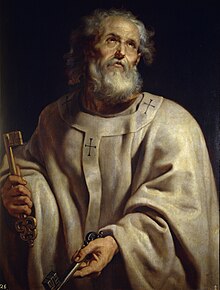Peter (given name): Difference between revisions
Appearance
Content deleted Content added
m Reverted edits by 94.192.94.30 (talk) to last version by VolkovBot |
name of article is fine. |
||
| Line 17: | Line 17: | ||
'''Peter''' is a common masculine [[given name]]. It is derived, via Latin "petra", from the [[Greek language|Greek]] word πετρος (''petros'') meaning "stone, rock" or in the ancient Phonecian times, "good looking".<ref>[http://www.mfnames.com/mnames/p/origin-and-meaning-of-peter.htm MFnames.com - Origin and Meaning of Peter]</ref> |
'''Peter''' is a common masculine [[given name]]. It is derived, via Latin "petra", from the [[Greek language|Greek]] word πετρος (''petros'') meaning "stone, rock" or in the ancient Phonecian times, "good looking".<ref>[http://www.mfnames.com/mnames/p/origin-and-meaning-of-peter.htm MFnames.com - Origin and Meaning of Peter]</ref> |
||
According to the [[New Testament]], Jesus gave |
According to the [[New Testament]], Jesus gave [[Saint Peter]] (whose given name was [[Simon]]) the name ''Kephas'' or ''[[Aramaic of Jesus#Cephas|Cephas]]'' meaning "stone" in [[Aramaic language|Aramaic]].<ref>[http://www.behindthename.com/name/peter BehindtheName.com - Meaning, Origin and History of the Name Peter]</ref> |
||
==In other languages== |
==In other languages== |
||
Revision as of 14:25, 25 January 2010
 Saint Peter as painted by Peter Paul Rubens. | |
| Pronunciation | piːtʊr, PE-ter, PAY-tur |
|---|---|
| Gender | Male |
| Origin | |
| Word/name | Greek |
| Meaning | stone |
| Other names | |
| Related names | Pete, Petey, Peadar, Pearce, Pedro, Per, Peta, Petra, Pierre, Piers |
Peter is a common masculine given name. It is derived, via Latin "petra", from the Greek word πετρος (petros) meaning "stone, rock" or in the ancient Phonecian times, "good looking".[1]
According to the New Testament, Jesus gave Saint Peter (whose given name was Simon) the name Kephas or Cephas meaning "stone" in Aramaic.[2]
In other languages
The following names can be interpreted as Peter in English.
Polish
In Polish it is spelled as Piotr. Diminutives/hypocoristics include Piotrek, Piotruś, and Piotrunio.
Individuals named Piotr may choose their name day from the following dates:[citation needed]
- January 3, 5, 9, 10, 16, 18, 28, 31
- February 2, 5, 8, 21, 23, 24
- March 2, 10, 12, 14, 23, 30
- April 6, 15, 26, 28, 29, 30
- May 3, 7, 8, 13, 15, 19, 22
- June 2, 3, 7, 23, 29
- July 2, 7, 8, 12, 25, 30
- August 1, 2, 3, 6, 11, 18, 27, 29, 30
- September 2, 9, 10, 12, 17, 23, 25
- October 3, 18, 19
- November 7, 16, 21, 24, 26
- December 4, 6, 9, 21, 25
Other
- Afrikaans: Pieter
- Albanian: Petro, Pjetër, Pjetri
- Amharic: Ṗeṭros
- Arabic: بطرس (Buṭrus)
- Aragonese: Pietro, Pero
- Azerbaijani: Pyotr
- Armenian: Պետրոս (Bedros in Western dialect, Petros in Eastern dialect)
- Asturian: Pedru
- Basque: Kepa, Peio, Peru
- Belarusian: Пётр (Piotr), Пятро (Piatro), Пятрусь (Piatruś)
- Bosnian: Petar
- Breton: Per
- Bulgarian: Петър (Petər), Пере, Перо (Pere, Pero), Петьо, Петю (Petyo, Petyu), Пеньо, Пеню, Пенко (Penyo, Penyu, Penko), Пельо, Пелю, Пелко (Pelyo, Pelyu, Pelko); Камен (Kamen) <<"kamen, kamək" in Bulgarian means: stone>>
- Catalan: Pere
- Cebuano language: Pedro
- Chinese:
- Protestant: 彼得 (Bǐdé)
- Catholic: 伯多祿 (Bóduōlù)
- Cornish: Peder
- Croatian: Petar
- Czech: Petr
- Danish: Peter, Peder, Per, Peer, Pelle
- Dutch: Pieter, Peter (Note: The form "Peer" also occurs, albeit less commonly. The Biblical Peter is translated as "Petrus".)
- Estonian: Peeter
- Faroese: Pætur, Petur, Per
- Frisian: Piter, Pier
- Finnish: Pietari, Pekka, Petri, Petteri
- French: Pierre (Note: True to the Greek, the word for stone in French is also "pierre")
- Galician: Pedro
- Georgian: პეტრე (Petre)
- German: Peter (Note: The form "Peer" also occurs, albeit less commonly. The Biblical Peter is translated as "Petrus".)
- Greek: Πέτρος (Petros)
- Haitian Creole: Pyè
- Hindi: Pathrus
- Hebrew : פטרוס (Petros)
- Hungarian: Péter; Petya, Peti (diminutive)
- Icelandic: Pétur
- Indian: Kaunteya
- Indonesian: Petrus
- Irish: Peadar
- Italian: Pietro, Piero
- Korean: 베드로 (Bedeuro; or, less commonly, 페트루스; Peteuruseu), 피터 (Piteo)
- Japanese: ピーター (Pītā), and in Biblical contexts ペトロ (Petoro), ペテロ (Petero), or ペトロス (Petorosu)
- Konkani: Pedru
- Latin: Petrus
- Latvian: Pēteris
- Lithuanian: Petras
- Lombard: Peder
- Low German: Petrus
- Luxembourgish: Peter
- Macedonian: Петар (Petar), Петре (Petre), Перо (Pero), Пере (Pere), Перица (Perica)
- Malayalam: Pathrose
- Maltese: Pietru
- Manx: Peddyr
- Māori: Petera
- Norman: Pierre
- Norwegian: Peter, Petter, Per
- Nahuatl: Pedro
- Occitan: Pèire, Pèir, Pèr
- Persian: پطرس (Patras)
- Polish: Piotr, Peter
- Portuguese: Pedro, Pêro (old Portuguese)
- Quechua: Pidru
- Romanian: Petru, Petre
- Russian: Пётр (Pyotr), Петя (Petya) (diminutive)
- Sardinian: Pedru, Perdu, Pretu
- Scottish Gaelic: Peadar, Peadair
- Serbian: Петар, Petar
- Silesian: Pyjter, Piter
- Slovak: Peter
- Slovene: Peter
- Spanish: Pedro
- Swahili: Petero
- Swedish: Peter, Petter, Per, Pehr, Pär, Pelle, Pälle
- Tamil: Pethuru, Raayappar (in biblical contexts)
- Thai: ปีเตอร์ (Piteor)
- Ukrainian: Петро (Petro), Петрик (Petryk) (diminutive), Петрусь (Petrus') (diminutive)
- Uzbek: Piter
- Venetian: Piero
- Vietnamese: Phêrô
- Võro: Piitre
- Welsh: Pedr
- West Frisian: Petrus
